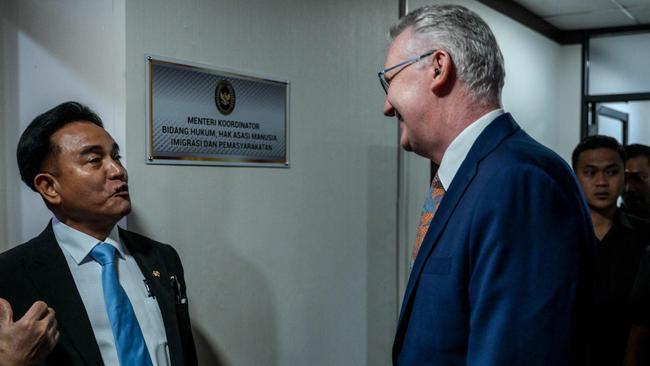Indonesian government requests Bali Nine prisoners be sent to Australia by Christmas
Indonesian officials have hinted that the remaining Bali Nine prisoners could be sent to Australia just before Christmas.
True Crime
Don't miss out on the headlines from True Crime. Followed categories will be added to My News.
Exclusive: Indonesia is hopeful they can finalise an agreement to transfer the Bali Nine inmates home in December, despite experts warning there are complex legal issues Australia will need to work through first.
Speaking in Bali overnight on Thursday, Indonesia’s minister for law Yusril Ihza Mahendra said his country had submitted a draft proposal for “practical arrangements” to facilitate the return of the five men and was awaiting Australia’s response.
“Australia … said to me, they will discuss this draft internally, and they will inform us as soon as possible,” he said.
“And if Australian government agreed or needs some modification or amendment, we are ready to discuss.”
Mr Yusril said Indonesian President Prabowo Subianto had “specifically” asked if the transfer could be finalised “if possible, before Christmas”.
He said the proposal was based on the “transfer” of prisoners from Indonesia, not a two-way “exchange” between the countries.
Mr Yusril said Indonesia was seeking the option of reciprocity in the future.
He said the Bali Nine deal was purely based on the “good intention and discretion” of Mr Prabowo, who was only inaugurated as leader in October.
“(The proposal) is not based on written law, but (hopefully) we can settle this matter with negotiation between two countries,” Mr Yusril said.
The Albanese Government will now go through the conditions presented by Indonesia in a draft proposal for the transfer of Scott Rush, Matthew Norman, Michael Czugaj, Martin Stephens and Si Yi Chen, who were arrested in 2005 trying to smuggle more than 8kg of heroin.

No deal has been reached to date, and both sides are insistent the plan is for a single “transfer” to Australia rather than a two-way exchange of prisoners, but the domestic political situation is fraught for the Indonesian government as it does not wish to appear soft on drug-related crimes.
Albanese had renewed Australia’s longstanding request for the return of the five men on compassionate grounds when he met with newly elected Indonesian President Prabowo Subianto in November, and received a positive response.
But ANU international law export Professor Donald Rothwell said it was “not very likely” the five members of the Bali Nine would return home by Christmas given work required on the Australian side to ensure any prisoner transfer complied with existing laws.
Prof Rothwell said short of negotiating a new prisoner transfer treaty – a process that would take months or even up to a year – the most likely option would be through a “bespoke” agreement dealing specifically with the five individuals.
“A memorandum of understanding may well be the short term fix,” he said.
“My sense, very much, is that it comes down to the political will on both sides and how urgent the Indonesians are to get this ... done.”

Indonesia’s legal affairs minister Yusril Ihza Mahendra revealed this week he hoped a deal would be struck this month, and said though his country would not pardon or grant clemency in narcotics cases, it would “respect” the authority of a recipient country to do so.
But Prof Rothwell said this was not a workable situation as Australia’s International Transfer of Prisoners Act required prisoners to continue to serve the sentence handed down by the foreign court, with no specific exceptions allowed.
This means the Albanese Government would either need parliament to amend the legislation, convince Indonesia to grant the pardon or possibly come to some specific agreement potentially in relation to the differing definitions of “life” imprisonment between the two countries.
Both the Coalition and Labor have avoided public commentary on the sensitive diplomatic issue this week, with Home Affairs Minister Tony Burke saying during his trip to Jakarta on Tuesday he had “full respect for the Indonesian legal system”.
Prof Rothwell said he believed Australian government lawyers would be “incredibly nervous” about what has been proposed by Indonesia.
But he said there may be a view among department officials that if Australia can “show good faith” with the Indonesians on this specific deal, it may pave the way for the longer term goal of having in place a more permanent international transfer arrangement.
“Which ultimately would be a good outcome for both countries, given the history and the difficulty that has been experienced in concluding such an agreement dating back 20 years,” he said.





